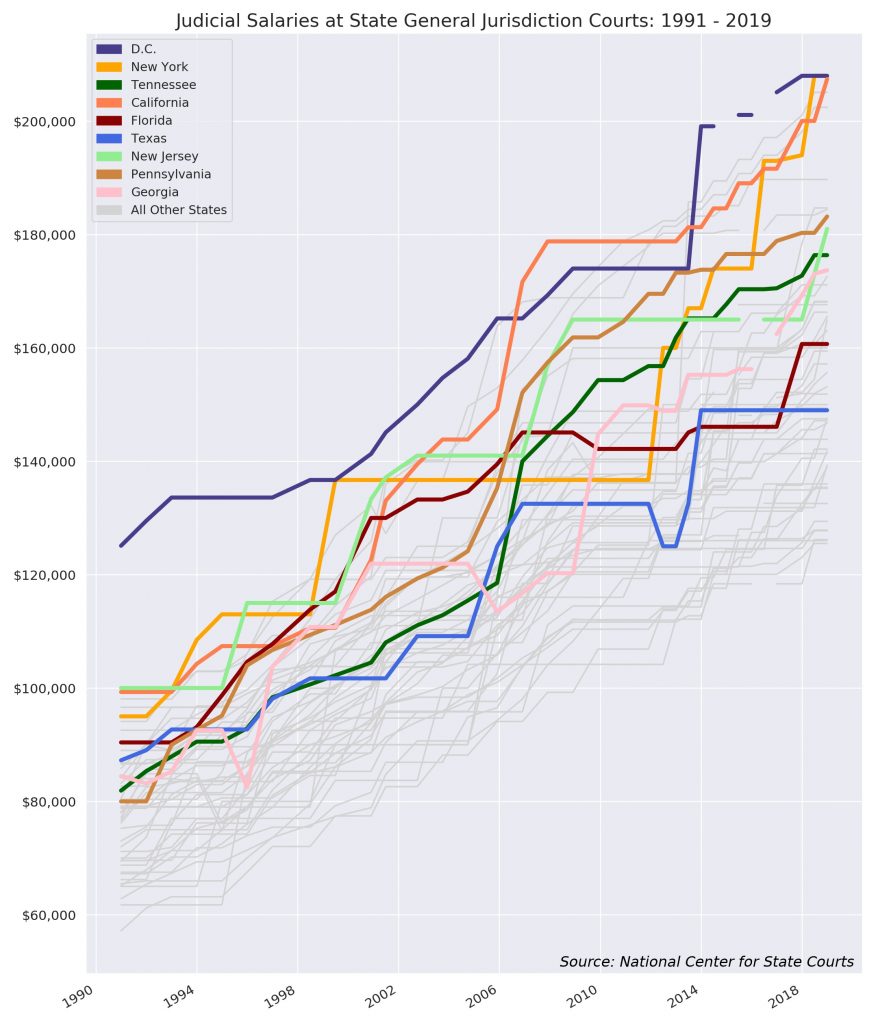Data Snapshot: Where Do State Judges Get Paid the Most? It's Complicated.
Pay has risen for sharply for trial court judges in New York over the past decade, while the D.C. judges have made the most on average for years. But cost of living factors mean the bench is more lucrative elsewhere.
February 25, 2019 at 05:00 AM
3 minute read
The National Center for State Courts (NCSC) has been gathering data on judicial salaries across the country for decades. At the end of January, it published its latest batch of numbers, showing that while pay has been rising sharply for general jurisdiction judges in New York, the dollar still goes the furthest for those on the bench down in Tennessee.
A Law.com analysis of judicial salary data for state courts of general jurisdiction – also called trial courts, the tier just below the state appellate courts – shows that New York judicial salaries have increased the most compared with other states, growing 52 percent over the past decade. Hawaii was not far behind, with 50 percent growth over the same period. Meanwhile, pay for judges at the same tier in Texas has been flat since 2014.
Going back to NCSC numbers from 1991, the data show that judges in Washington D.C. have had the highest pay on average. But according to a ranking that the center compiles based on cost-of-living data from an organization called C2ER, trial court judges in Tennessee have gotten paid the most in real terms for at least the past five years.
 William Raftery, a senior analyst at the NCSC, noted that the increase in pay for New York judges came only after 12 years of stagnation – which the chart above illustrates. In 2015, New York's Commission on Legislative, Judicial, and Executive Compensation recommended a pay increase that pegged the salary of New York trial court judges to the same amount paid U.S. district court judges, effective April 2019. (The recommendations were adopted absent an override from the legislature.) U.S. district judges were paid $208,000 annually in 2018.
William Raftery, a senior analyst at the NCSC, noted that the increase in pay for New York judges came only after 12 years of stagnation – which the chart above illustrates. In 2015, New York's Commission on Legislative, Judicial, and Executive Compensation recommended a pay increase that pegged the salary of New York trial court judges to the same amount paid U.S. district court judges, effective April 2019. (The recommendations were adopted absent an override from the legislature.) U.S. district judges were paid $208,000 annually in 2018.
The numbers are reported by different agencies for each state, and the NCSC doesn't mandate how the states aggregate their numbers if there is any variation in pay between different courts within the state. That can make a comparison somewhat more nuanced, said Blake Kavanaugh, who was in charge of gathering statistics for the NCSC this year. Some years, a jurisdiction may not respond, leaving a gap in the data.
While the trend line in the chart above shows salaries rising for state trial court judges over time across the country (no state has reported a pay decrease any year since 1991), importantly, the figures have not been adjusted for inflation. Overall, the mean salary for judicial positions in January 2019 increased less than 1 percent from July 2018, the NCSC noted in a press release announcing the new numbers.
Raftery added that the pay data also don't take into account how much of judges' salaries are paid automatically into health care plans or pensions. “In some instance, the judges come out a little bit worse for wear,” he said.
This content has been archived. It is available through our partners, LexisNexis® and Bloomberg Law.
To view this content, please continue to their sites.
Not a Lexis Subscriber?
Subscribe Now
Not a Bloomberg Law Subscriber?
Subscribe Now
NOT FOR REPRINT
© 2025 ALM Global, LLC, All Rights Reserved. Request academic re-use from www.copyright.com. All other uses, submit a request to [email protected]. For more information visit Asset & Logo Licensing.
You Might Like
View All
The Week in Data Jan. 24: A Look at Legal Industry Trends by the Numbers

The Week in Data Jan. 21: A Look at Legal Industry Trends by the Numbers

The Week in Data Dec. 13: A Look at Legal Industry Trends by the Numbers
Trending Stories
Featured Firms
Law Offices of Gary Martin Hays & Associates, P.C.
(470) 294-1674
Law Offices of Mark E. Salomone
(857) 444-6468
Smith & Hassler
(713) 739-1250









